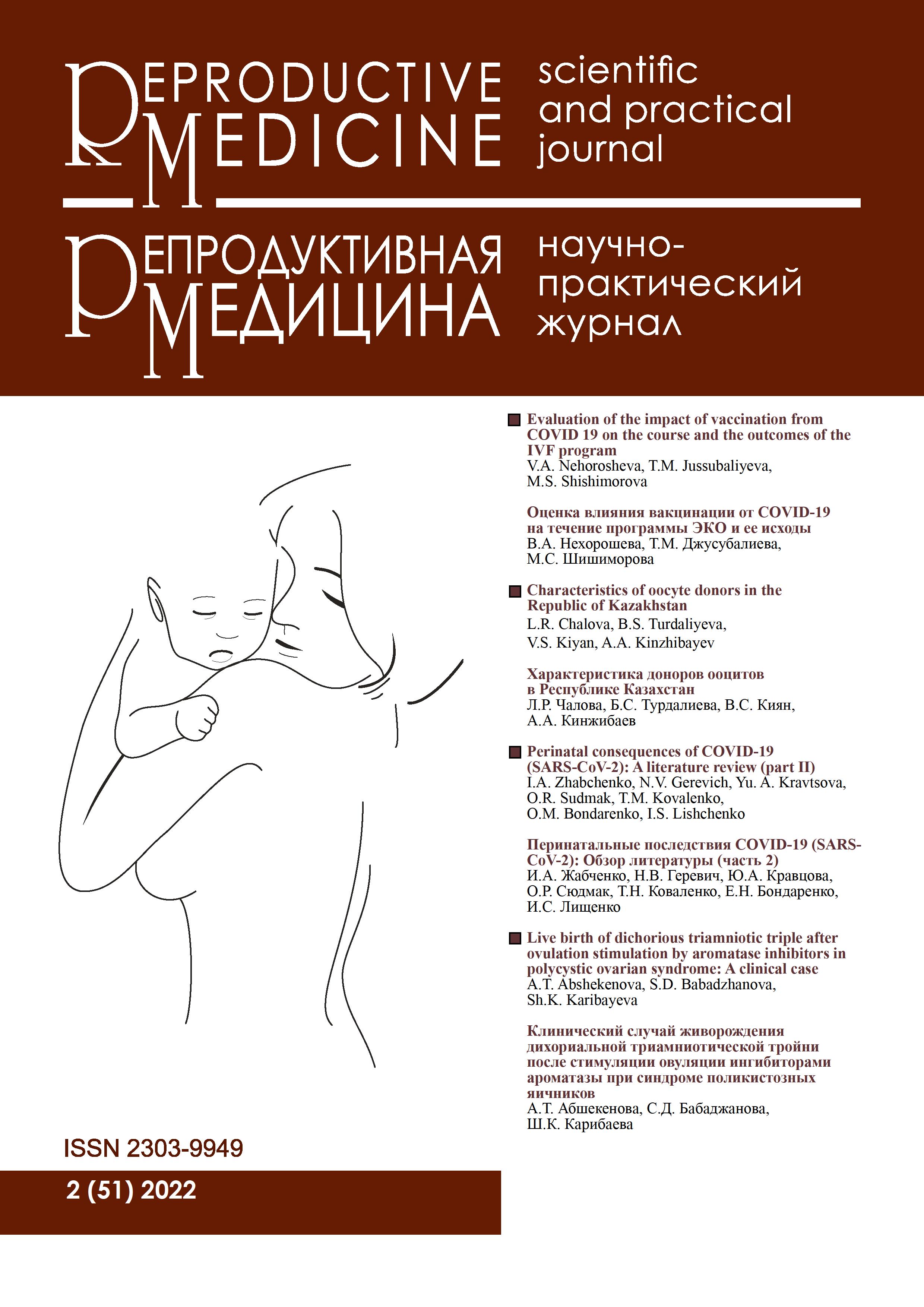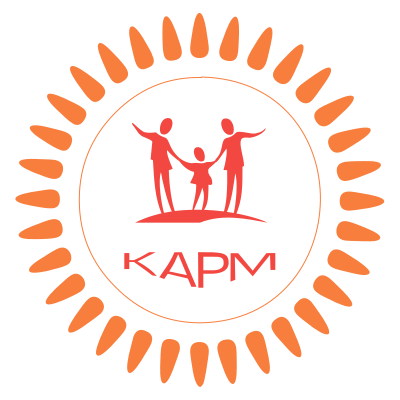The efficiency of assisted reproductive technologies programs depending on human acrocentric chromosome polymorphic variants
DOI:
https://doi.org/10.37800/RM.2.2022.22-30Keywords:
infertility, assisted reproductive technologies, cytogenetic analysis, molecular genetic study, karyotyping, chromosomal abnormalities, chromosomal polymorphism, acrocentric chromosomes, satellite regions of chromosomesAbstract
Relevance: A key role in the treatment of female and male infertility of various causes is played by assisted reproductive technologies (ART). Moreover, conducting molecular cytogenetic studies of married couples makes it possible to identify genotype features that positively correlate with impaired reproductive function. For a long time in ongoing studies, due attention was not paid to chromosomal polymorphisms (CP), since they were not considered clinically significant. To date, published scientific data do not allow making a definitive conclusion about the contribution of CP to chromosomal abnormalities during early ontogenesis, which is why this issue remains debatable and relevant.
The study aimed to analyse the effect of chromosomal polymorphisms of acrocentric chromosomes (D/G groups) in male and female karyotypes on the effectiveness of ART cycles.
Methods: A controlled single-centre retrospective study of the effectiveness of ART cycles was conducted among 188 infertile couples with polymorphic variants of acrocentric chromosomes in the karyotype. Groups of patients with CP were compared with the control group (557 pairs without CP in karyotypes) according to such criteria as the normal fertilization rate, the quality of the embryos, the blastulation rate, the implantation rate (IR), the clinical pregnancy rate (CPR), the miscarriage rate (MR).
Results: The analysis of the obtained results did not show a statistically significant difference in the number of retrieved oocytes from oocyte pick-up (OPU), the number of cleaved embryos, and the blastulation rate of excellent quality embryos in the groups of patients with CP. Also, no differences were observed when comparing the normal fertilization rate and the blastulation rate between the groups of patients with CP and patients with normal karyotypes. However, there was a trend toward a decrease in the implantation rate (44.4 vs. 49.4%), clinical pregnancy rate (54.7 vs. 58.9%) and an increase in the miscarriage rate among couples in which at least one of the partners is a carrier of CP.
Conclusion: The results of the study showed that the presence of CPs leads to a decrease in the effectiveness of ART programs, also negatively affects parameters such as IR, CPR, as well as increases early pregnancy losses. The data obtained confirm the importance of karyotyping patients in order to choose the most effective method of ART treatment.
References
Гончарова Н.Н., Мартышкина Е.Ю., Казначеева Т.В., Арсланян К.Н., Адамян Л.В., Курило Л.Ф., Сорокина Т.М., Черных В.Б. Медико-генетические аспекты бесплодия // Акушерство, гинекология и репродукция. – 2012. – Т. 6. – №. 2. – С. 35-40. https://www.gynecology.su/jour/article/view/319/411.
Christofolini D.M., Mafra F.A., Neto R.P., de Almeida Barros R.A.S., dos Santos A.A., Peluso C., Gava M.M.m Ghirelli-Filho M., Bianco B., Barbosa, C.P. Correlation between chromosomal variants and male infertility in a population of Brazilian infertile men // Reprod. Sys. Sexual Disord. – 2012. – Vol. 1(1). – Art. ID 1000105. https://doi.org/10.4172/2161-038X.1000105.
Гонтарь Ю.В., Ильин И.Е., Парницкая О.И. Роль цитогенетического обследования семейной пары и абортивного материала при случае замершей беременности // Вісник проблем біології і медицини. – 2014. – Т. 1. – №. 3. – С. 73-78. https://cyberleninka.ru/article/n/rol-tsitogeneticheskogo-obsledovaniya-semeynoy-pary-i-abortivnogo-materialapri-sluchae-zamershey-beremennosti.
Абильдинова Г.Ж. Итоги и перспективы развития медицинской генетики // Клин. Мед. Казахстана. – 2017. - №.3 (45). – С. 8-10. https://doi.org/10.23950/1812-2892-JCMK-00483.
Ким Т.Н., Абимульдина С.Т., Ким И.Г. Влияние полиморфных вариантов хромосом на результативность программ вспомогательных репродуктивных технологий // Вестник Караганд. Унив-та. Серия: Биол. Мед. Геогр. – 2016. – Т. 82. – №. 2. – С. 21-28. http://rmebrk.kz/journals/2799/96759.pdf.
Li S.J., Cheng Y.X., Zhou D.N., Zhang Y., Yin T.L., Yang J. Chromosomal polymorphisms associated with reproductive outcomes after IVF-ET // J. Assist. Reprod. Genet. – 2020. – Vol. 37. – Issue 7. – P. 1703-1710. https://doi.org/10.1007/s10815-020-01793-8.
Serapinas D., Valantinavičienė E., Machtejevienė E., Bartkevičiūtė A., Bartkevičienė D. Evaluation of chromosomal structural anomalies in fertility disorders // Medicina. – 2021. – Vol. 57. – Issue 1. – P. 37. https://doi.org/10.3390/medicina57010037.
Ni T., Li J., Chen H., Gao Y., Gao X., Yan J., Chen Z. J. Male chromosomal polymorphisms reduce cumulative live birth rate for IVF couples // J. Assist. Reprod. Genet. – 2017. – Т. 34. – №. 8. – С. 1017-1025. https://doi.org/10.1007/s10815-017-0951-1.
Cheng R., Ma Y., Nie Y., Qiao X., Yang Z., Zeng R., Xu L. Chromosomal polymorphisms are associated with female infertility and adverse reproductive outcomes after infertility treatment: a 7-year retrospective study // Reprod. Biomed. Online. – 2017. – Vol. 35. – Issue 1. – P. 72-80. https://doi.org/10.1016/j.rbmo.2017.03.022.
Xu X., Zhang R., Wang W., Liu H., Liu L., Mao B., Zhang X. The effect of chromosomal polymorphisms on the outcomes of fresh IVF/ICSI–ET cycles in a Chinese population // J. Assist. Reprod. Genet. – 2016. – Vol. 33. – Issue 11. – P. 1481-1486. https://doi.org/10.1007/s10815-016-0793-2.
Всемирная организация здравоохранения. Руководство ВОЗ по исследованию и обработке эякулята человека. – 5-е изд. – М.: Медико-генетический научный центр РАМН, Капитал Принт, 2012. – С. 291. https://apps.who.int/iris/bitstream/handle/10665/112544/97859051060905_rus.pdf?sequence=1&isAllowed=y.
McGowan-Jordan J., Hastings R.J., Moore S. (eds.). ISCN 2020: An International System for Human Cytogenomic Nomenclature (2020) (Cytogenetic and Genome Research). – 1st edn. – Karger, 2020. – ISBN-13: 978-3318067064.
Downloads
Published
How to Cite
Issue
Section
License
The articles published in this Journal are licensed under the CC BY-NC-ND 4.0 (Creative Commons Attribution – Non-Commercial – No Derivatives 4.0 International) license, which provides for their non-commercial use only. Under this license, users have the right to copy and distribute the material in copyright but are not permitted to modify or use it for commercial purposes. Full details on the licensing are available at https://creativecommons.org/licenses/by-nc-nd/4.0/.




